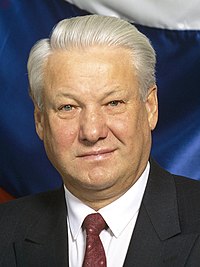User:Sandoria/Sandbox3
Kazimierz Glogowski | |
|---|---|
 Glogowski's 1989 portrait | |
| President of West Miersa | |
| In office 1982–2004 | |
| Preceded by | Sylwester Petroski |
| Succeeded by | Tomasz Kopernik |
| Voivode of Swiecizar | |
| In office 1980–1982 | |
| Preceded by | Romauld Garbowski |
| Succeeded by | Andrzej Pluta |
| Personal details | |
| Born | 14 July 1931 Tarclaw, Soravia |
| Died | 20 August 2006 Krada, West Miersa |
| Political party | Republika (1980-1981) Independent (1981-1989) Zabowiazanie (1989-2004) |
| Spouse | Faustyna Olszanska |
| Children | 3 |
Kazimierz Glogowski (Miersan: Казимерь Глого́вски; Kazimierz Głogówski; 14 July 1931 – 20 August 2006; aged 76) was a West Miersan politician and statesman who served as the President of West Miersa from 1982 to 2004. He also served as the Voivode of the Swiecizar Voivodeship from 1980 to 1982.
Born in Tarclaw in 1931 during the Great War, his family was poor and would be homeless for much of his early childhood. After the Great War his family would be able to regain some of the wealth they had lost from the war. Glogowski would go attend Krada National University in the 1940s. Here he would study economics and political theory.
He would go on to work for the Republika party, the sole ruling party of West Miersa at the time, and rose through it's ranks. During the 1970s student protests across West Miersa occurred, he was a major critic of the government's "moderate" response to the protests. He eventually became the Voivode of Swiecizar in 1980.
Shortly after becoming Voivode the Miersan War broke out with East Miersa invading the country. Dissatisfied with them, he would leave the Republika party and become an independent. He would become a major figure in the protection of Krada from being and defeating the Eastern forces in Swiecizar at Tarclaw. He became a war hero and became very popular. He was elected President of West Miersa in 1982 as the Lemovician War broke out.
He would instate isolationist policies, he percieved that Soravia had "abandoned" West Miersa during the Miersan War. He would instate Miersination policies that included ethnic cleansing of Savaders, Soravians, and Lemovicians. Champania would invade and annex Lemovicia, defeating the West Miersan forces. But Glogowski was able to retain power.
In 1989 he would found Zabowiazanie, a right-wing nationalist political party and would become to rebuild relations with Soravia. He would join Samorspi in the 1990s and began to finally reopen West Miersa to the world. He would resign due to illness in 2004 and was succeeded by his right-hand man Tomasz Kopernik. He would retain a position in the party until his death in 2006.
Early life
Glogowski was born to Emil and Karolina Glogowski on June 14 1931 in Tarclaw, Swiecizar. His father was a farmer from the outskirts of the city, and his mother worked at home, he had two siblings, his elder sister Marta and elder brother Patryk. His family was initially fairly wealthy, but he was born when Tarclaw was part of the Soravian front of the Great War, where Amathian and Gaullican forces fought Soravia. His family was greatly devastated by the war and became homeless for much of his early childhood. His sister died when he was 2 years old.
Only until after the end of the war and the foundation of the Miersan Republic did their family come out of poverty and homelessness. Glogowski would later attend the Krada National University with his brother Patryk, they would both study economics and political science and theory.
He would later meet and marry his wife, Faustyna Olszanska, in 1953. The two would eventually have three children. He would go on to join the local Republika party, the sole ruling party of West Miersa at the time. He would work for the party's Tarclaw office.

